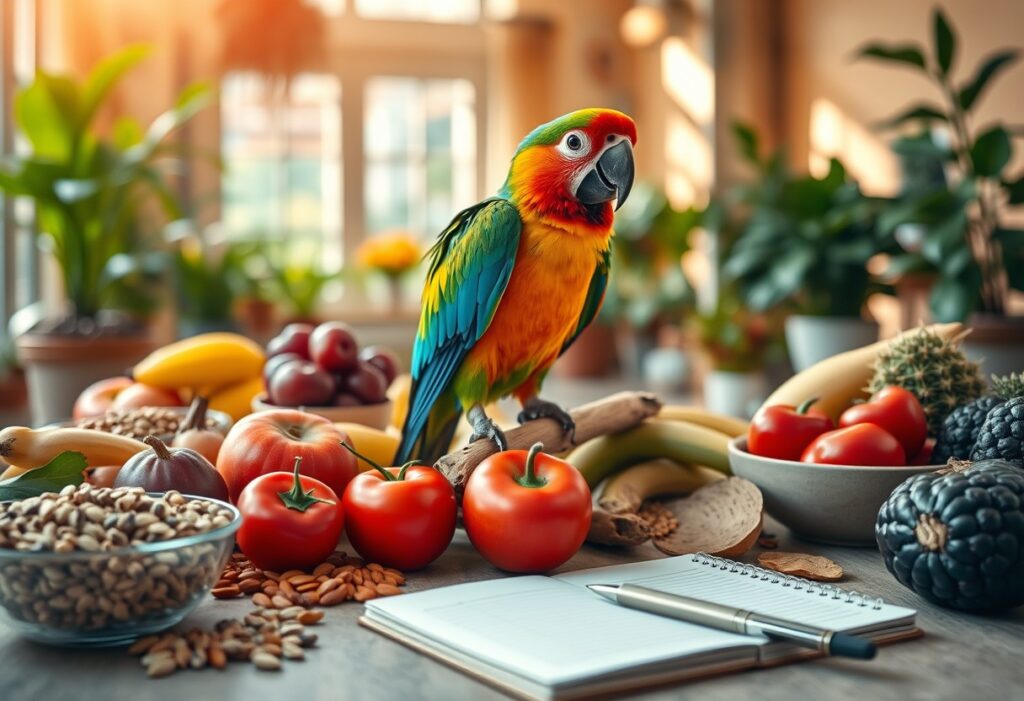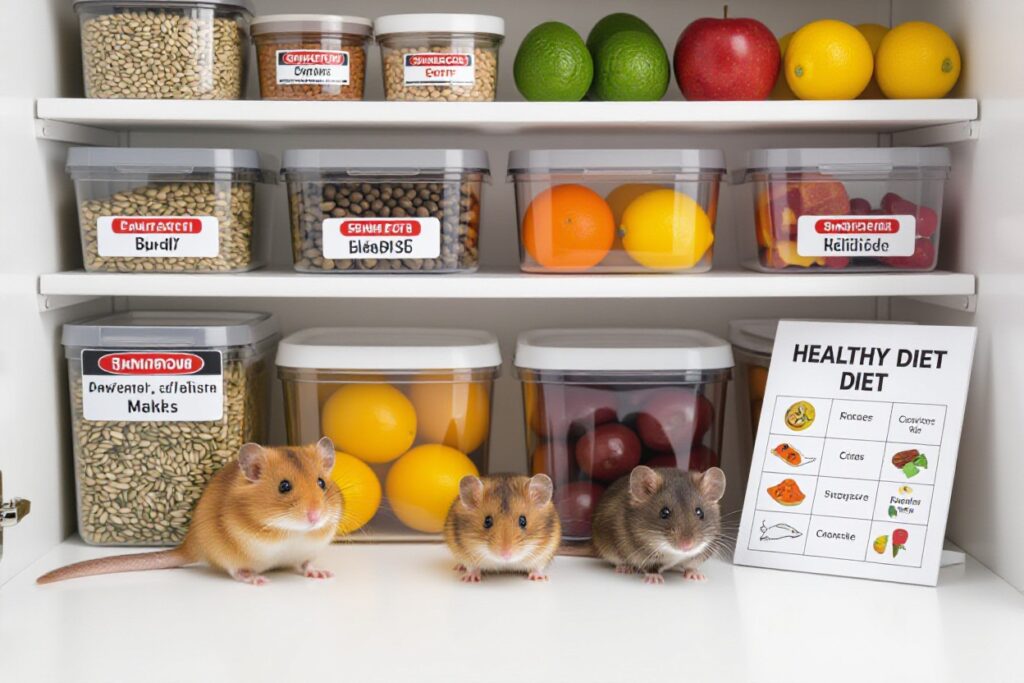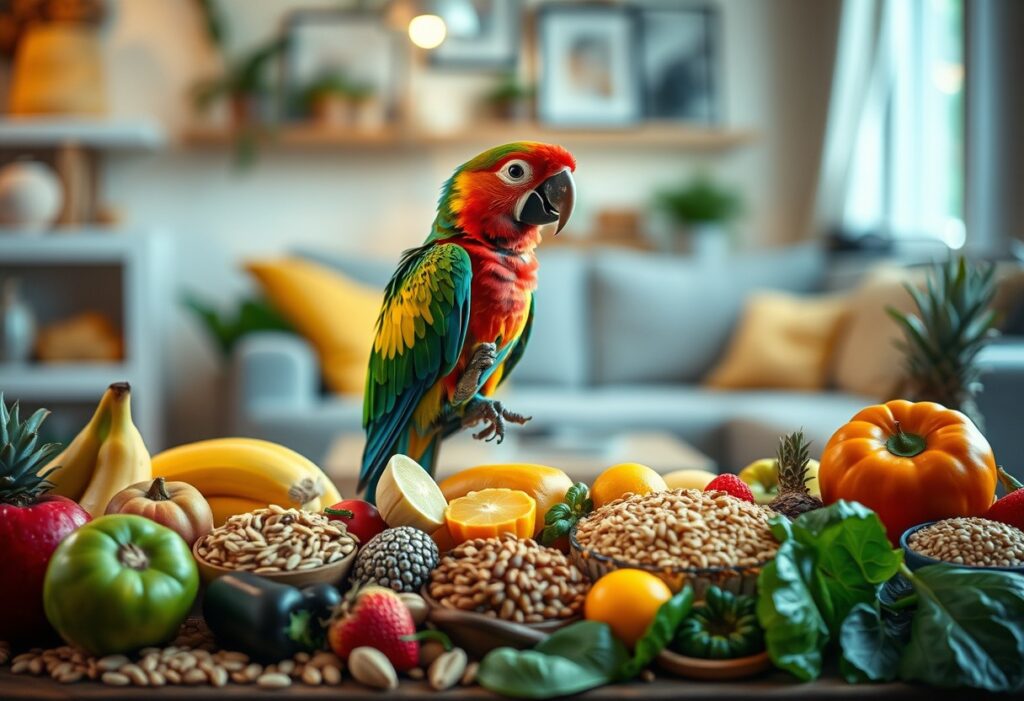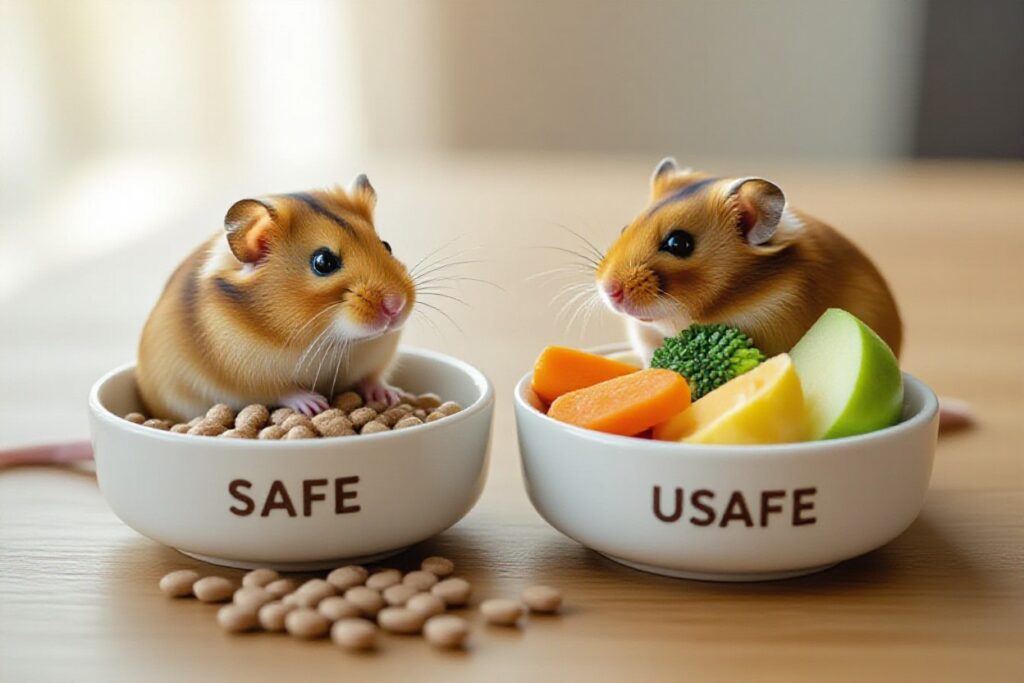Diet plays a crucial role in your parrot’s health and happiness. To ensure your feathered friend thrives, you need to provide a well-rounded diet that includes a variety of fresh fruits, vegetables, pellets, and seeds. Avoid feeding them toxic foods like chocolate and avocado, as these can be dangerous. By taking the time to understand your parrot’s nutritional needs, you can create a balanced meal plan that promotes their overall well-being and longevity. Let’s explore how you can achieve this for your beloved companion.
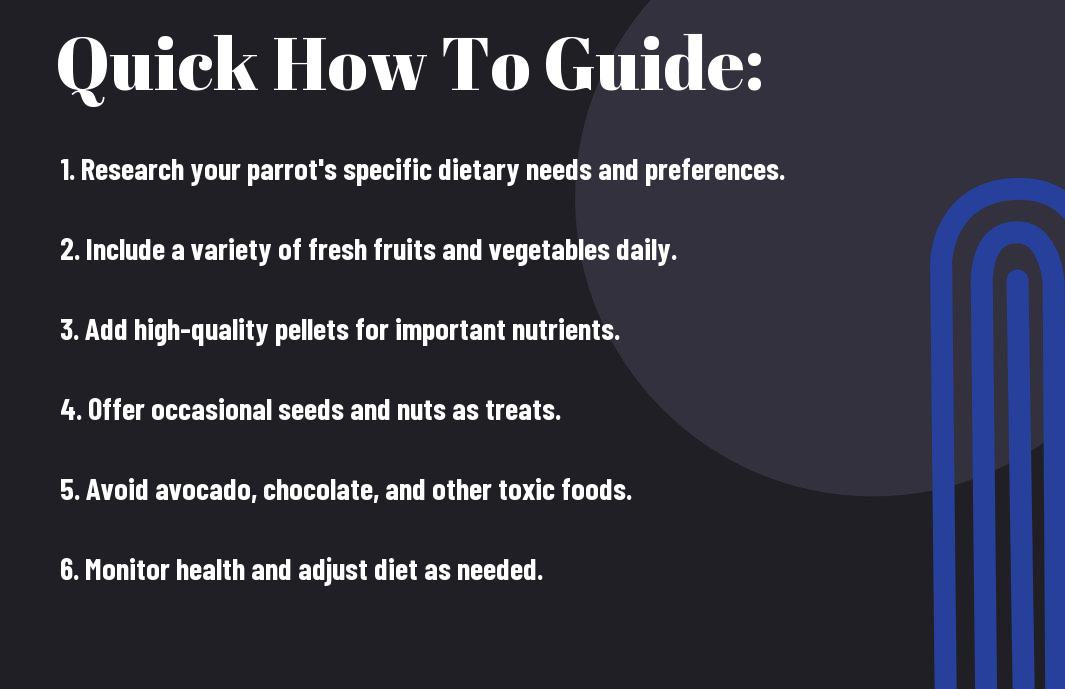
Understanding the Nutritional Needs of Parrots
To ensure your parrot thrives, it is important to understand its unique nutritional needs. Parrots, being intelligent and active birds, require a well-rounded diet that mirrors their natural feeding habits in the wild. This includes a combination of seeds, fruits, vegetables, and special formulated pellets to provide the necessary vitamins and minerals. Knowing what your feathered friend needs will enable you to create an optimal feeding plan that promotes health and well-being.
Essential Nutrients for Parrots
If you want to keep your parrot healthy, you should familiarize yourself with the important nutrients they require. Key components of a balanced parrot diet include carbohydrates, proteins, fats, vitamins, and minerals. Carbohydrates offer energy, while proteins are crucial for growth and tissue repair. Healthy fats contribute to overall energy and help in the absorption of fat-soluble vitamins. Moreover, vitamins (such as Vitamin A, D, and E) and minerals (like calcium and phosphorus) are vital to maintain a robust immune system and strong bones.
In addition to these nutrients, some parrots benefit from antioxidants, which help combat oxidative stress and may support longevity. Fruits and vegetables are excellent sources of these, along with other phytonutrients that aid in preventing disease. Always aim to provide a diverse range of foods to ensure your parrot gets all the nutrients it needs for a balanced diet.
Age and Species Considerations
One critical factor that impacts your parrot’s dietary needs is its age and species. Young parrots typically require a diet rich in calories and protein to support their rapid growth and development. In contrast, adult parrots may not need as many calories but still require adequate nutrition to maintain energy and health. Moreover, different species of parrots can have unique dietary preferences and requirements, which means you should tailor your feeding practices according to your parrot’s specific needs.
Nutrients are crucial not just for growth and maintenance, but also for reproduction in breeding parrots. For example, female parrots may need an increase in calcium and protein during breeding seasons. Conversely, aged parrots generally require easier-to-digest foods, as their metabolism slows down and they experience a decrease in overall energy levels. Therefore, being aware of these factors will help you support your parrot’s long-term health effectively.
How to Choose the Right Foods
Any pet owner wants what’s best for their feathered friend, and choosing the right foods is a crucial part of ensuring your parrot’s health and happiness. With a variety of options available, it’s vital to understand the nutritional needs of your parrot and how to incorporate a balanced diet that includes fresh produce, seeds, grains, and commercial diets. Let’s explore these categories to help you make informed choices.
Fresh Fruits and Vegetables
Fresh fruits and vegetables are vital components of a balanced diet for your parrot. They provide vital vitamins, minerals, and antioxidants that promote overall health and well-being. You should aim to offer a variety of colorful fruits and veggies, such as carrots, bell peppers, spinach, and apples, as these tend to have a broader range of nutrients. Always remember to wash produce thoroughly and cut them into manageable pieces for your parrot. This approach not only encourages foraging but also makes it easier for your feathered companion to eat.
It’s important to recognize that not all fruits and vegetables are safe for your parrot. For example, some foods like avocado and onion can be toxic and may lead to serious health issues. Therefore, it’s crucial to do your research and ensure that you’re providing safe options. Incorporating fresh produce can also stimulate your parrot’s interest in food, making mealtime more enjoyable and enriching.
Seeds and Grains
Some parrots enjoy seeds and grains, which can be a part of their diet. However, it’s vital to understand that these foods should not constitute the entirety of your parrot’s meals. While seeds are energy-dense and provide an immediate source of calories, they are often high in fat and lack critical nutrients. Instead of relying solely on seed mixes, you should supplement them with other food groups to ensure your parrot receives a comprehensive diet.
To create a balanced diet for your parrot, consider offering seeds as a treat rather than a primary food source. Focus on integrating a variety of whole grains, such as brown rice, quinoa, or whole grain pasta, which can provide important carbohydrates and fiber. By diversifying your parrot’s diet with seeds and whole grains, you can ensure they receive a more holistic range of nutrients while keeping their energy levels in check.
Pellets and Commercial Diets
Clearly, pellets and commercial diets are designed to meet the specific nutritional needs of parrots, often providing balanced protein, vitamins, and minerals in a convenient format. Many bird owners find that pellets make feeding easier since they eliminate the guesswork associated with creating a balanced diet from scratch. When choosing pellets, look for high-quality brands that use natural ingredients and avoid those with artificial colors or preservatives.
In addition to convenience, pellets can encourage proper digestion and reduce the risk of selective eating habits that some parrots may develop with seeds. Gradually introducing pellets into your parrot’s diet can help create a stable and nutritious feeding regimen, ensuring your bird gets all the vital nutrients it requires. However, it’s important to keep an eye on your parrot’s overall diet and not rely solely on pellets, as incorporating other food groups will promote a richer and more varied feeding experience.
For instance, while commercial diets are an excellent foundation, you should still prioritize providing fresh fruits, vegetables, and occasional seeds. This combination helps to maximize the nutritional benefits while keeping your parrot engaged and happy during mealtime. Remember that a varied diet is not only beneficial for your parrot’s health but also promotes mental stimulation and enjoyment.
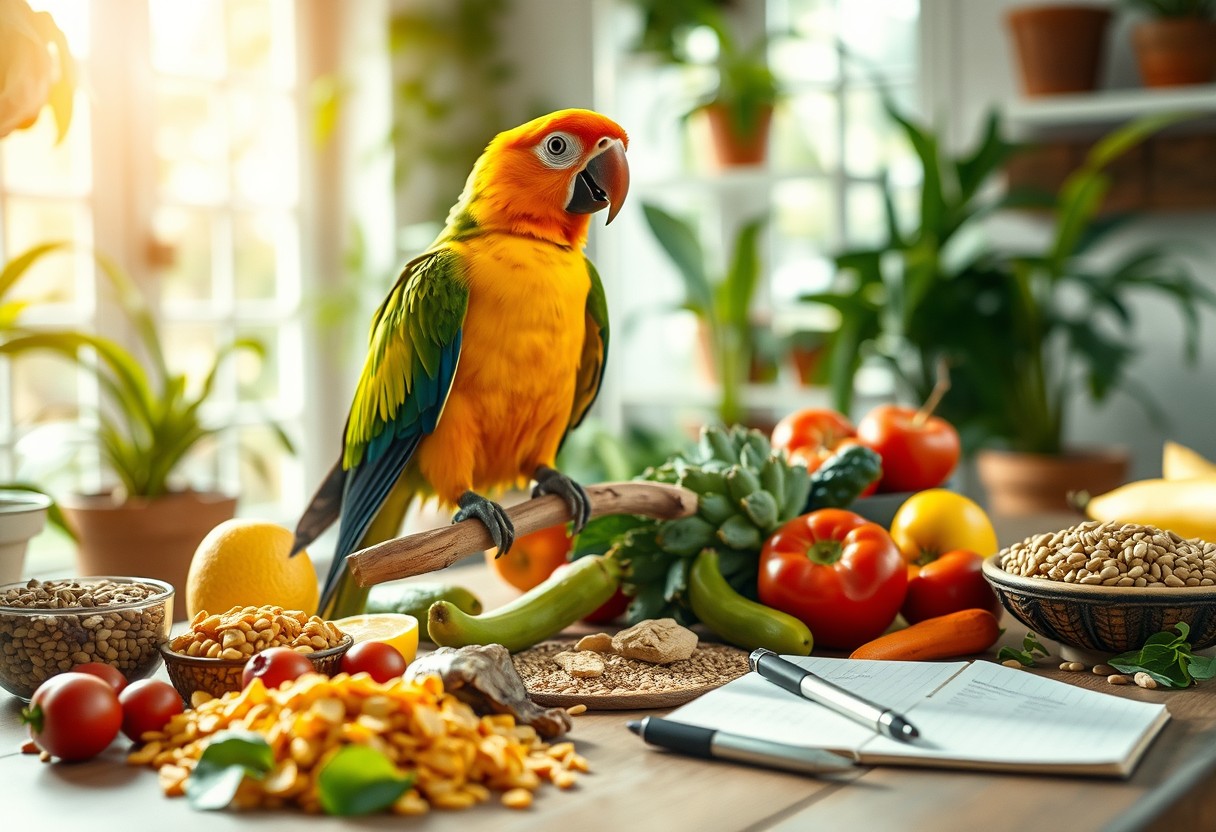
Tips for Balancing Your Parrot’s Diet
All parrot owners want to ensure their feathered friends live a happy and healthy life, and achieving a balanced diet is vital in this process. Here are some imperative tips to help you create a nutritious menu for your parrot:
- Ensure a mix of fruits, vegetables, grains, and protein.
- Maintain proper portion control to prevent overeating.
- Avoid harmful foods to protect your parrot’s health.
- Incorporate a variety of foods to keep your parrot engaged.
Thou should remember that creating a balanced diet for your parrot is not just about offering different types of food but also about ensuring they receive the correct nutrients necessary for their well-being.
Portion Control and Serving Sizes
Control is a crucial aspect of your parrot’s diet, as portion sizes can directly impact their health and longevity. Most parrots require a diet that consists primarily of high-quality pellets, supplemented with fresh fruits and vegetables. You should provide these items in measured servings according to your parrot’s size and species. For instance, smaller species may need about 1-2 tablespoons of pellets and ¼ cup of veggies or fruits daily, while larger parrots might require more.
Be mindful not to overfeed your bird, which can lead to obesity and other serious health issues. Assess your parrot’s weight regularly and adjust your meal sizes as necessary. Providing food once or twice a day can help keep them on a consistent feeding schedule, allowing you to monitor their intake effectively.
Avoiding Harmful Foods
Sizes matter when it comes to the food choices you offer your parrot. Certain foods can be toxic and potentially fatal to birds. It’s imperative to completely avoid items like chocolate, avocado, caffeine, and alcohol, as even small quantities can harm your feathered companion. Additionally, you should remain cautious of high-sugar and high-fat foods that can lead to obesity and other health problems in parrots.
Tips for avoiding harmful foods include researching common household items that are dangerous to parrots. Always consult your veterinarian for a comprehensive food list that outlines what to avoid, ensuring that your parrot remains safe and healthy. By learning which foods are harmful, you can better protect your parrot’s well-being.
Incorporating Variety
Even if you find a specific mix of nutritious foods that your parrot enjoys, it is imperative to incorporate a variety of items into their diet. Same foods offered repeatedly can lead to boredom and dietary imbalances. By introducing new fruits, vegetables, and protein sources, you not only keep your parrot’s taste buds excited but also ensure they receive a broader range of imperative vitamins and minerals necessary for their health.
Moreover, you can experiment with different preparation methods, like steaming or pureeing vegetables, to make them more appealing. Varietal exposure can also play a significant role in your parrot’s psychological stimulation, which is critical for their overall happiness.
Another effective approach to incorporating variety is to rotate different types of fruits and vegetables throughout the week. Offering seasonal produce not only ensures freshness but also introduces new flavors and textures that can excite your parrot’s palate and encourage them to try different foods.
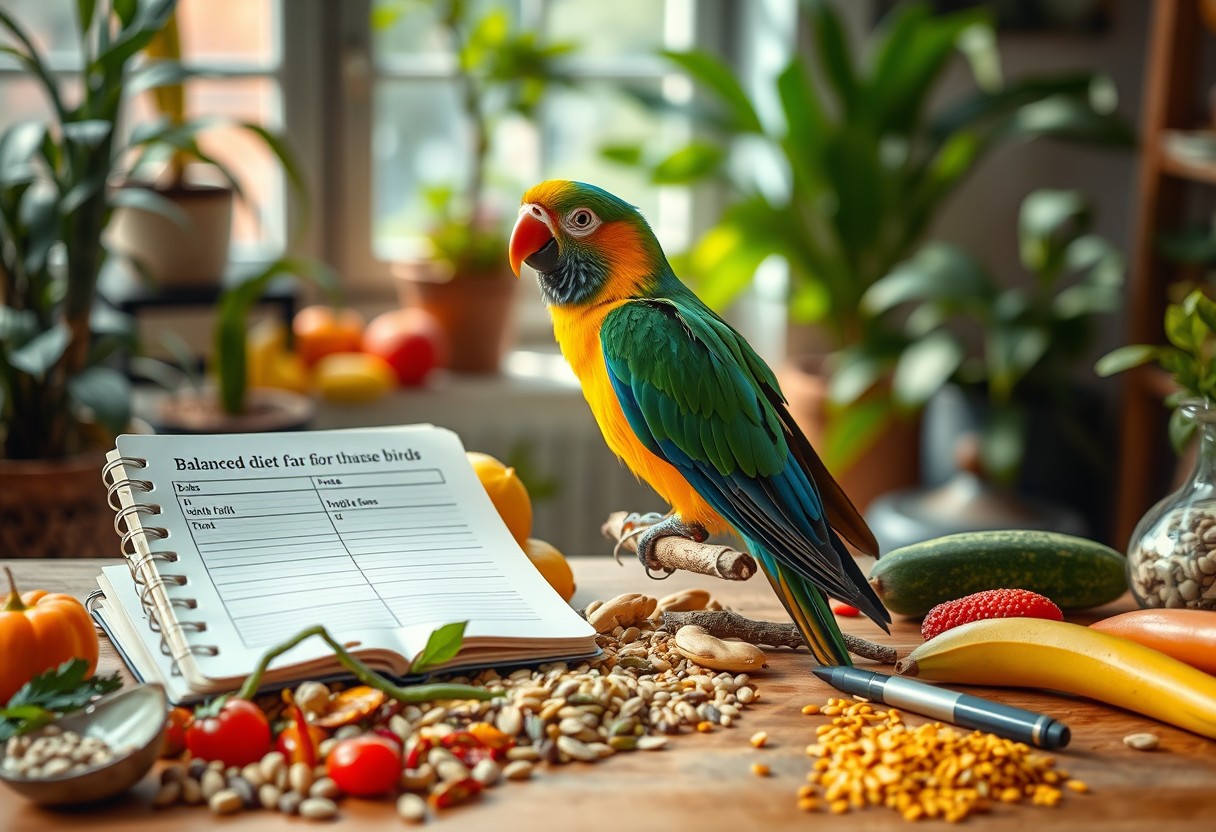
Factors Influencing Your Parrot’s Dietary Choices
Not all parrots share the same dietary preferences, and several factors can influence what your feathered friend may enjoy or require in their diet. Recognizing these factors can help you make better decisions about their meals, ensuring they lead a happy and healthy life. Below are some key influences:
- Behavioral factors and preferences
- Health conditions that may arise
- Environmental elements and habitat
Behavioral Factors and Preferences
Dietary choices in parrots are often influenced by their behavioral traits and individual preferences. Just like humans, all parrots have unique likes and dislikes when it comes to food. Some may favor fruits over vegetables, while others may exhibit a strong preference for seeds or nuts. Additionally, your parrot’s social environment can affect their eating habits; if they see other birds enjoying a particular food, they might be more inclined to try it themselves. Monitoring their reactions to various foods can provide valuable insight into what they truly enjoy.
Moreover, age and social interactions significantly influence dietary choices. Younger parrots tend to be more adventurous, while older ones might become more set in their ways. Allowing your parrot to explore a range of foods and encouraging them during meals can make a difference in their dietary preferences. Be mindful of, fostering a positive eating experience is important for their willingness to try new and beneficial foods. Recognizing these preferences early can greatly enhance your parrot’s balanced diet.
Health Conditions and Dietary Restrictions
Restrictions regarding your parrot’s diet can often stem from various health conditions that might be present. It’s crucial to pay attention to any potential health issues, as some parrots may require specific dietary modifications to maintain their health. Issues such as obesity, for instance, can lead to the necessity of a more controlled diet, while beak deformities may necessitate softer food options. Always consult with an avian veterinarian to determine the best course of action for your bird’s particular needs.
To ensure that you are providing a diet suitable for your parrot’s health conditions, consider potential food allergies, sensitivities, or disease predispositions that may guide your dietary choices. Additionally, be mindful of the best practices in nutrition for various species of parrots, as each has its own dietary requirements. Focus on providing a variety of foods that align with their needs, but keep in mind that some may need to be restricted from certain ingredients. Thou understand that staying attuned to these health-related factors can play a vital role in your parrot’s overall well-being and happiness.
Summing up
Ultimately, creating a balanced diet for your parrot is important for their overall health and well-being. By incorporating a variety of fresh fruits, vegetables, high-quality pellets, and occasional seeds, you ensure that your feathered friend receives the diverse nutrients they need to thrive. Regularly changing up their diet can also prevent boredom, encouraging natural foraging behaviors. Remember to monitor their weight and adjust portion sizes accordingly, keeping in mind that not all birds have the same dietary needs.
Additionally, it’s vital to educate yourself about the specific dietary preferences and requirements of the parrot species you own. Each species may have unique nutritional needs that could affect their energy levels, plumage, and even lifespan. By staying informed, consulting with an avian veterinarian, and observing your parrot’s specific responses to different foods, you can fine-tune their diet and create a feeding plan that keeps them happy and healthy for years to come.
Q: What are the key components of a balanced diet for parrots?
A: A balanced diet for parrots should include a variety of foods that provide necessary nutrients. Key components include:
- Pellets: High-quality pellets should form the foundation of your parrot’s diet, as they are nutritionally complete.
- Fruits and Vegetables: Fresh fruits and vegetables should make up about 20-25% of their daily intake. These provide vitamins, minerals, and hydration.
- Seeds and Nuts: While seeds should be limited due to high-fat content, a small amount of nuts and seeds can be offered as treats or rewards.
- Grains and Legumes: Whole grains and cooked legumes can offer additional protein and fiber, contributing to a well-rounded diet.
Always make sure fresh food is provided daily and monitor for any changes in appetite, which could indicate health issues.
Q: How do I introduce new foods to my parrot without causing digestive issues?
A: Introducing new foods to your parrot should be done gradually to prevent digestive upset or rejection of unfamiliar items. Here are some steps:
- Start Slow: Begin by offering a small piece of the new food alongside their regular diet. Monitor their response and ensure they continue to eat their usual foods.
- Observe Preferences: Each parrot has unique tastes. Test different fruits, vegetables, and grains to see what they enjoy most.
- Mix It Up: Combine new foods with familiar ones. For example, mix steamed broccoli with their preferred pellets or seeds to encourage them to try the new item.
- Be Patient: Some parrots may take time to accept new foods. Continue offering a variety while respecting their growth process.
Always ensure new foods are safe for parrots before introducing them, as some foods, such as avocado or chocolate, can be toxic.
Q: How can I ensure my parrot is getting the right vitamins and minerals?
A: To ensure your parrot is receiving the necessary vitamins and minerals, follow these guidelines:
- Offer a Variety of Foods: A diverse diet helps cover a range of nutritional needs. Include different fruits, vegetables, grains, and proteins in their meals.
- Use Fortified Pellets: Choose high-quality pellets that are specifically formulated for parrots, as they are often fortified with necessary vitamins and minerals to help prevent deficiencies.
- Consult a Veterinarian: Regular check-ups with an avian veterinarian can help assess your parrot’s diet and health. They can suggest specific supplements if needed, depending on your bird’s individual needs.
- Monitor Behavior and Health: Keep an eye on your parrot’s energy levels, feather condition, and overall behavior. Sudden changes may indicate dietary deficiencies.
It’s necessary to provide fresh food daily and remove any uneaten items to prevent spoilage, ensuring your parrot remains healthy and well-nourished.
